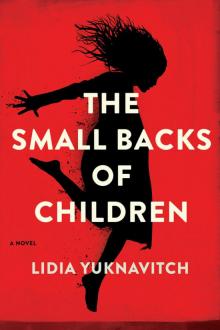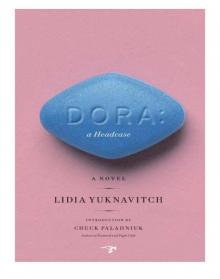- Home
- Lidia Yuknavitch
The Chronology of Water Page 2
The Chronology of Water Read online
Page 2
One morning my sister heard me sobbing in the shower. She pulled the curtain back, looked at me holding my empty gutted belly, and stepped inside to embrace me. Fully clothed. We stayed like that for about 20 minutes I think.
Possibly the most tender thing anyone has ever done for me in my entire life.
I WAS BORN cesarean. Because one of my mother’s legs was six inches shorter than the other, her hips were tilted. Gravely.
Doctors told her she could not have children. I don’t know whether to admire the ferocity of her will for deciding to have my sister and me, or to wonder what kind of woman would risk killing her own infants - heads crushed by the tilted pelvis - before they could be born. My mother never believed she was “crippled.” My mother brought my sister and me into the world of my father.
When the conventional doctors voiced their medical concerns to my mother, she went to another kind of doctor. An obstetrician/gynecologist who practiced alternative approaches to health. Dr. David Cheek was best known for his work using hypnosis on patients using their fingers to tell him the subconscious causes of emotional or physical illness. The process is called “ideomotor.” Particular fingers are designated (by the doctor or the patient) “yes,” “no,” and “don’t want to answer.” When the doctor asks the hypnotized patient questions the relevant finger lifts in response - even when the patient consciously thinks otherwise, or has no conscious awareness of the answer.
In my mother’s case, this technique was used to help her through cesarean labor. Dr. Cheek would say things to my mother during her labor such as: “Dorothy, do you have pain?” And she would answer with her finger. He would ask, “Is it here?” And stimulate the area. She would answer. He would ask, “Dorothy, can you relax your cervix for 30 seconds?” She would. “Dorothy, I need you to decrease the bleeding … here.” And she would.
My mother was an important case study.
Dr. Cheek believed we are imprinted with particular emotions even while in the womb. He claimed to have taught hundreds of women to communicate telepathically with their unborn children.
When my mother told my birth story, her voice took on a particular aura. As if something close to magical had transpired. I believe that is what she believed. My father’s telling of the story was equally filled with reverence. As if my birth were otherworldly.
The morning I went into labor with my daughter the sun had not come up yet. I woke up because I didn’t feel anything moving in me. I put my hands all over the world of my belly and nothing nothing nothing but a strange taut round. I went to the bathroom and peed and an electrical shock traveled up my neck. When I wiped there was bright red blood. I woke my sister. She wore worry in her eyes. I called my doctor. She told me it was probably fine and to come in when the clinic opened in the morning. In my belly there was an immovable weight.
I remember crying in great waves. I remember my throat locking up. Being unable to speak. My hands going numb. Child things.
When morning came, even the sun looked wrong.
In my body, birth came last.
Metaphor
I’M GOING TO TELL YOU SOMETHING THAT HELPS. NOT IN the usual way; this isn’t in any textbooks or guidebooks. It has nothing to do with self-help or breathing or stirrups or speculums - god knows that territory has been done to death with its terminologies and systems - first second third trimester, quickening, lightening, labor, expecting, fetal heartbeat, uterus, embryo, womb, contractions, crowning, cervical dilation, vaginal canal, breathe - that’s it, little short breaths, transition, push.
But what I want to tell you is away from this story. The truth of it is, the story of a woman having a baby is the fiction we make it. More precisely, a woman with bulging life in her belly represents - is a metaphor for making a story. A story we can all live with. The fertilization, the gestation, the containment, the production of a story.
So let me give you a tip. Something you can use in relation to this grand narrativity, this epic status, something you can live with when the time comes.
Collect rocks.
That’s all. But not just any rocks. You are an intelligent woman so you look for the unimaginable inside the ordinary. Go to places you would not ordinarily go alone - riverbanks. Deep woods. The part of the ocean shore where peoples’ gazes disappear. Wade in all waters. When you find a group of rocks, you must stare at them a long while before you choose, let your eyes adjust, use what you know of the long wait waiting. Let your imagination change what you know. Suddenly a gray rock becomes ashen or clouded with dream. A ring round a rock is luck. To find a red rock is to discover earthblood. Blue rocks make you believe in them. Patterns and flecks on rocks are bits of different countries and terrains, speckled questions. Conglomerates are the movement of land in the freedom of water, smoothed into a small thing you can hold in your hand, rub against your face. Sandstone is soothing and lucid. Shale, of course, is rational. Find pleasure in these ordinary palm worlds. Help yourself prepare for a life. Recognize when there are no words for the pain, when there are no words for the joy, there are rocks. Fill all the clear drinking glasses in your house with rocks, no matter what your husband or lover thinks. Gather rocks in small piles on the counters, the tables, the windowsills. Divide rocks by color, texture, size, shape. Collect some larger stones, place them along the floor of your living room, never mind what the guests think, build an intricate labyrinth of inanimates. Move around your rocks like a curl of water. Begin to detect smells and sounds to different varieties of rock. Give names to some, not geological, but of your own making. Memorize their presence, know if one is missing or out of place. Bathe them in water once each week. Carry a different one in your pocket every day. Move away from normal but don’t notice it. Move towards excess but don’t care. Own more rocks than clothing, than dishes, than books. Lie down next to them on the floor, put the smaller ones in your mouth occasionally. Sometimes, feel lithic, or petrified, or rupestral instead of tired, irritable, depressed. At night, alone, naked, place one green, one red, one ashen on different parts of your body. Tell no one.
Now.
After months of collecting, when your house is full and swollen, when you begin to experience contractions and dilation, after you check the color of the too red blood, after you use a timepiece to record the seconds, minutes, after you begin to regulate your breathing and abandon your thinking to the story you have been told about this, and, after your baby is born dead in the morning - which you cannot find in the story you were told - after you think of the words “born” and “dead” next to one another, turn to the rocks. Turn to the rocks and hear seas echoed from as far away as the Ukraine. Smell kelp and taste salt; feel that underwater animals have brushed near you. Remember parts of your body are scattered in water all over the earth. Know land is made from you. Lie all the baby clothes that have been given to you as scripts or gifts on the floor in lines. Sit with the tiny clothes and your rocks and think of nothing at all. Have endless patterns and repetitions accompanying your thoughtlessness, as if to say let go of that other more linear story, with its beginning, middle, and end, with its transcendent end, let go, we are the poem, we have come miles of life, we have survived this far to tell you, go on, go on.
You will see you have an underlying tone and plot to your life underneath the one you’ ve been told. Circular and image bound. Something near tragic, near unbearable, but contained by your irreducible imagination -who would have thought of it but you - your ability to metamorphose like organic material in contact with changing elements. The rocks. They carry the chronology of water. All things simultaneously living and dead in your hands.
On Sound and Speech
IN MY HOUSE ONE OF THE CORNERS OF THE LIVING room was called the crybaby corner. When you cried, you had to go stand there facing the corner. The principle was one of shame. My sister tells me that when she was sent to the crybaby corner she would cease crying almost immediately. I can picture her leaving the wall with a face as stoic as a nun�
�s. Almost like an adult.
By the time I arrived in the family, eight years after my sister, the laws of the house were in place. But none of them seemed to work on me. By the time I was four, when I cried, I wailed. Epically. And I cried all the time. I cried when I had to go to bed. I cried in the night. I cried when people I didn’t know looked at me. I cried when people I did know talked to me. I cried when someone tried to take my picture. I cried being dropped off at school. I cried when new food was presented to me. I cried when sad music played. I cried when we put the ornaments on our Christmas trees. When people would open the door to my “trick or treat” at Halloween. I cried every single time I had to go to a public restroom. Or in bathrooms in anyone’s house. Or bathrooms at school. Until I was in seventh grade.
I cried when bees came near me. I cried when I wet my pants - in kindergarten, first, second, third, and sixth grades. When I got any bruise or scratch or cut. I cried when they put me to bed in the dark. When strangers spoke to me. When children were mean, when my hair was tangled or ice cream hurt my head or my underwear was inside-out or I had to wear galoshes. I cried when they threw me in Lake Washington for my first swimming lesson. When I got shots. At the dentist. When I got lost in grocery stores. When I went to movies with my family - in fact, one of the more famous of my crying stories happened when they took me to see Gone With the Wind. When the little girl has the pony accident and Rhett leaves Scarlett my grief was inconsolable. For about a week.
I cried when my father yelled - but I also cried sometimes just when he entered the room.
When my mother or sister were sent to retrieve me, the victories were small. About the size of a child.
It was my voice that left.
In my house the sound of leather on the skin of my sister’s bare bottom stole my very voice out of my throat for years. The great thwack of the sister who goes before you. Taking everything before you are born. The sound of the belt on the skin of her made me bite my own lip. I’d close my eyes and grip my knees and rock in the corner of my room. Sometimes I’d bang my head rhythmically against the wall.
I still cannot bear her silence while being whipped. She must have been eleven. Twelve. Thirteen. Before it stopped. Alone in my room I put a pillow over my head. Alone in my room I got my parka out of the closet and buried my skull in it. Alone in my room I drew on the walls - knowing the punishment - pushing the waxen color as hard as I could against the wall. Until it broke. Until I heard it stop. Until I heard my sister going into the bathroom. I would steal inside and hug her knees. My silent mother ghost would make a bubble bath. My sister and I would sit in it together. Voiceless, we would soap each other’s backs and make skin pictures with our fingernails. If the picture was on your back, you had to guess what it was. I drew a flower. I drew a smiley face. I drew a Christmas tree that made my sister cry - but only into her hands. No one could have heard her. Only her shoulders and back moved. The red marks of a child’s fingernails remaining even after the soap washes off.
When my sister left the house I was 10.
I didn’t speak to anyone outside of my immediate family until I was about 13. Not even when called upon at school. I’d look up, my throat the size of a straw, my eyes watering. Nothing. Nothing. Or this: if an adult required me to speak, I’d hold one leg up stork like with one hand, and my other arm I’d put behind my head in an “L” shape, and I’d rock until I lost balance. Instead of talking. Little bird ballet. Little girl making an “L” for Lidia with her arm. Anything but speech. All those years with my sister in front of me I was silent. And after she left. Terror stealing the voice of a girl.
Sometimes I think my voice arrived on paper. I had a journal I hid under my bed. I didn’t know what a journal was. It was just a red notebook that I wrote pictures and true things and lies in. Interchangeably. It made me feel-like someone else. I wrote about my father’s angry loud voice. How I hated it. How I wished I could kill it. I wrote about swimming. How I loved it. About how girls made my skin hot. About boys and how being around them made my head hurt. About radio songs and movies and my best friends Christy and how I was jealous of Katie but also wanted to lick her and how much I loved my swim coach Ron Koch.
I wrote about my mother … the back of her head driving me to and from swim practice. Her limp and leg. Her hair. How gone she was, selling houses, winning awards into the night. I wrote letters to my gone away sister that I never sent.
And I wrote a little girl dream. I wanted to go to the Olympics, like my teammates.
When I was 11 I wrote a poem in my red notebook that went: In the house/alone in my bed/my arms ache. My sister is gone/my mother is gone/my father designs buildings/in the room next to mine/he is smoking. I wait for 5 a.m./I pray to leave the house/I pray to swim.
My voice, she was coming. Something about my father’s house. Something about alone and water.
The Best Friend
WHEN I WAS 15 MY FATHER TOLD ME THAT WE WERE moving from Washington state to Gainesville, Florida because the best swim coach in the nation was there - Randy Reese, the coach of Florida Aquatic Swim Team.
I remember sitting in my room alone thinking what? Why would we leave our home out of the blue for something called F.A.S.T.? Why would we leave the trees and the mountains and the rain and the green of the Northwest for a strip of sand and alligators? We didn’t know anyone in Florida. I’d never been there. The only things that mattered to me were at the pool - the only people I trusted or loved, the only time in my life I felt O.K., the only place I felt like something besides daughter. And why was he telling me we were moving for me? I didn’t ask for that. Why would I?
I loved my swim coach. He was the only man I knew who was kind to me. He’s the man that explained to me why there was blood running down my leg at swim practice and what to do about it when I thought I was dying of cancer. He’s the man that I spent six hours a day six days a week with training to win. He corrected my stroke. He pushed me when I tired. He lifted me up in his arms when I won and put an arm around me and a towel when I lost. When I said, “ What about Ron Koch?” My father, he said, “ No one knows Ron Koch.”
When I asked my mother her face creased with worry. She pat one hand with the other on her thigh and said “ Well, Belle, your daddy’s been promoted. It’s a lot of money.”
When I asked her if she wanted to move to Florida, she said, “ He says you deserve the best. Besides Belle, it’s sunny!”
In reality, my father got promoted to lead architect for the southeastern coast. But that isn’t what he told me. It was, as he put it, the sacrifice they were making for me.
Inside our house always smelled like cigarette. Back in my bed I thought about my best friend Christie. Who I ’d known since I was five. Who I’d been eating lunch with everyday in the locker halls of high school. Who I’d sit by in Art class wishing every class was art class. Whose family I’d vacationed with, wishing they were mine. I cried so hard I chewed on my pillowcase until it ripped.
And so I left the water of one pool and slipped into another. Water, you’d think it would be the same everywhere. But it is not. The tap water in Florida tastes like swampshit. The water that comes out of the shower is weirdly slippery. The water that comes out of the sky is warm, and leaves behind a thick steam that chokes people who are not used to it. The ocean water is the temperature of urine, and the pool water is lukewarm even in December. Like a giant bath gone dull. Hurricanes go to Florida.
I hated it.
Randy Reese barely looked at me. There were Olympians on his team. I’d try to catch them, keep up with them, and sometimes succeed, but no matter how hard I swam or what my times were or my weight or place on the podium, I never felt like I was … his. When I did well, he’d show me my splits on a clipboard. Numbers. I’d stand there dumb and dripping, waiting for a hug. But he was not that kind of man. Before important swim meets? He’d make all the women swimmers weigh themselves. If you didn’t hit your weight? You’d get “licks.” A Sty
rofoam kickboard whack at the back of your thighs and ass. One lick for every pound of flesh. In this way the pool became a place of shame, and so there was nothing to distinguish it any longer from my home.
Whatever promise I may have carried in my swimmer skin, whatever hope I had in the water began to drown. At home the weight and rage of father took the air out of the rooms. At the pool a man yelled on the side and hit us with kick boards and never smiled.
At the State Swimming Championships my senior year our 200 yard medley relay had the best time in the nation. I stood on the podium with the three other girls and looked out into the stands. My father wasn’t anywhere. My mother smelled like vodka - it seemed I could smell it all the way across the pool. Randy Reese didn’t even look at me. Then Jimmy Carter took all little girl dreams of swimmer glory away from our bodies with a boycott - Randy’s famous pool full of winners included - anyway. There was no word left to belong to. Not athlete, not daughter.
I hated Randy Reese. I hated Jimmy Carter. I hated god. Also my math teacher, Mr. Grosz. I hated my father most of all, a hate that never left but just changed forms. My life had been ruined by men. Now even the water seemed to forsake me.
But I met a boy not like any other in the water.
In the pool with me. For those excruciating three years in Hogtown. A beautiful boy. With a long body and long arms and long legs and long eyelashes and long hair. And dark tanned skin. And dark eyes. And he had a secret in his skin too - not about fathers though.
This boy, my friend, was hands down the most talented artist in high school. That’s an idiotic way to say it - he was more talented than ANY of the people in ANY high school; in fact, he was more talented than ANYONE in Florida who called themselves “artists” by about 500 miles long and 160 miles wide. He painted. He sculpted. He drew. When he did, there was not anything that ever came out of his hands that was not astonishing.

 The Small Backs of Children
The Small Backs of Children The Chronology of Water
The Chronology of Water Dora: A Headcase
Dora: A Headcase The Book of Joan
The Book of Joan Verge
Verge